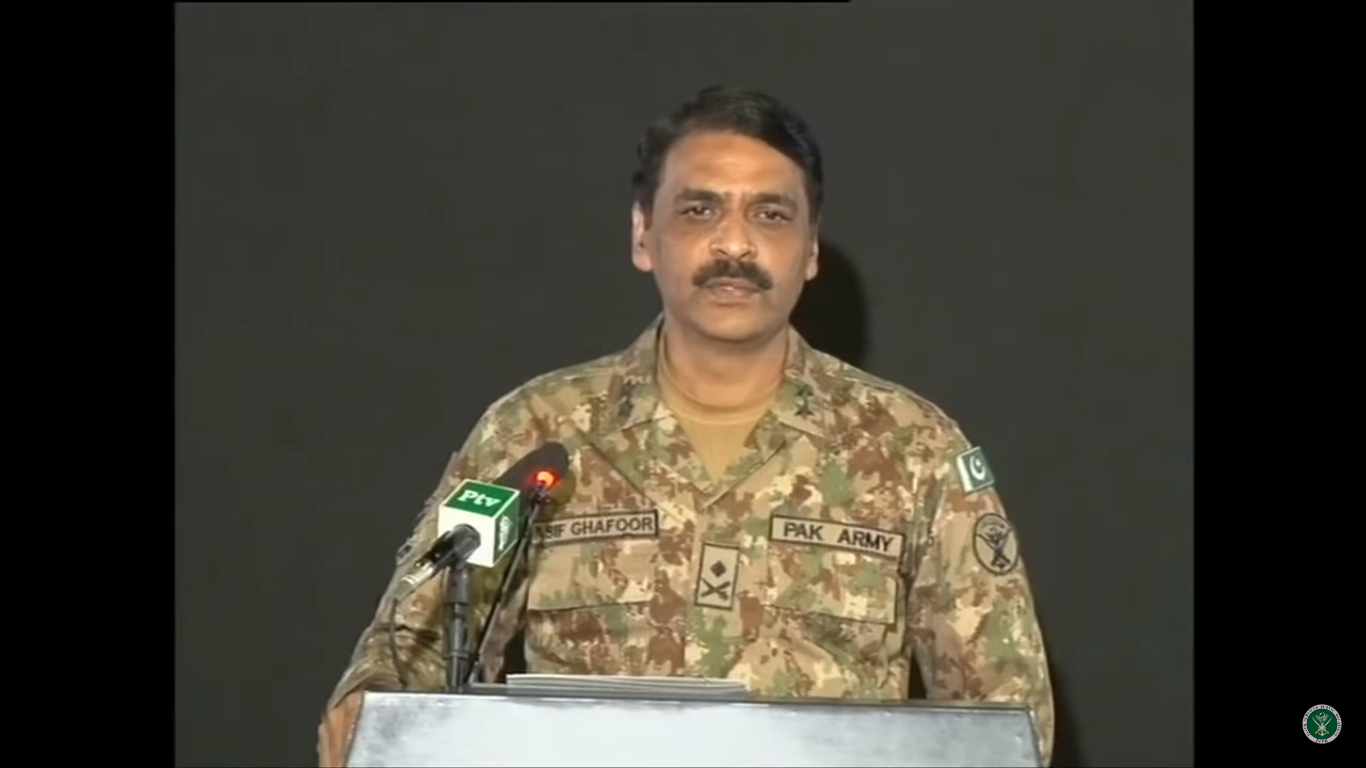News
Pakistan says it downed 2 Indian warplanes, captured pilot

Pakistan’s army spokesman Maj. Gen. Asif Ghafoor said Pakistani troops on the ground captured the Indian pilot. One of the downed planes crashed in Pakistan’s part of Kashmir while the other went down in Indian-controlled section of the Himalayan region, he said. (Photo Screengrab from ISPR Official/Youtube)
MUZAFFARABAD, Pakistan — Pakistan’s air force shot down two Indian warplanes after they crossed the boundary between the two nuclear-armed rivals in the disputed territory of Kashmir on Wednesday and captured one Indian pilot, a military spokesman said.
The dramatic escalation came hours after Pakistan said mortar shells fired by Indian troops from across the frontier dividing the two sectors of Kashmir killed six civilians and wounded several others.
Pakistan’s army spokesman Maj. Gen. Asif Ghafoor said Pakistani troops on the ground captured the Indian pilot. One of the downed planes crashed in Pakistan’s part of Kashmir while the other went down in Indian-controlled section of the Himalayan region, he said.
Indian air force spokesman Anupam Banerjee in New Delhi said he had no information on Pakistan’s statement. Earlier, senior Indian police officer Munir Ahmed Khan said an Indian Air Force plane crashed in Indian-controlled sector of Kashmir and that it wasn’t immediately known if there were casualties.
Another police officer, S.P. Pani, said firefighters were at the site in Budgam area where the Indian warplane crashed. Eyewitnesses said soldiers fired in air to keep residents away from the crash site.
Indian news reports said airports in the Indian portion of Kashmir closed for civilian traffic shortly after the air force jet crashed in the area. The Press Trust of India news agency said these airports were located at Srinagar, Jammu and Leh. Indian authorities declined to comment.
Indian administrator Baseer Khan confirmed that the airport in Srinagar, the main city in Indian-controlled Kashmir, was closed and said it was a “temporary and precautionary measure.”
Press Trust of India said Indian authorities also closed two airports in northern Punjab state, which borders with Pakistan.
Meanwhile, the foreign ministry in Islamabad said the country’s air force was carrying out airstrikes from within Pakistani airspace across the disputed Kashmir boundary but that this was not in “retaliation to continued Indian belligerence.”
The ministry said Wednesday’s strikes were aimed at “avoiding human loss and collateral damage.” It says the Pakistanis have “no intention of escalation, but are fully prepared to do so if forced into that paradigm. That is why we undertook the action with clear warning and in broad daylight.”
According to local Pakistani police official Mohammad Altaf, the six fatalities in the shelling earlier on Wednesday included children. The shells hit the village of Kotli in Pakistan’s section of Kashmir.
Kashmir is split between Pakistan and India and claimed by both in its entirety. Though Pakistani and Indian troops in Kashmir often trade fire, the latest civilian casualties came a day after tensions escalated sharply following a pre-dawn airstrike and incursion by India on Tuesday that New Delhi said targeted a terrorist training camp in northwestern Pakistan.
Residents on both sides of the de-factor frontier, the so called Line of Control, said there were exchanges of fire between the two sides through the night. In Pakistan’s part of Kashmir, hundreds of villagers fled border towns.
The situation was no different in villages along the Line of Control in Indian-controlled Kashmir, where residents were moving to safer places following the intense exchange of fire, which began Tuesday and continued Wednesday. In New Delhi, Indian officials said Wednesday at least five of their soldiers were wounded in firing by Pakistani troops along the volatile frontier.
Lt. Col. Devender Anand, an Indian army spokesman, said Pakistani soldiers targeted dozens of Indian military positions across the Line of Control throughout the night. An Indian military statement said that “out of anger and frustration,” Pakistan ”initiated unprovoked ceasefire violation.”
The statement said Indian troops “retaliated for effect” and claimed to have destroyed five Pakistani posts. It accused Pakistani soldiers of firing mortars and missiles “from civilian houses, using villagers as human shields.”
In Tuesday’s pre-dawn strike by India, Pakistan said Indian warplanes dropped bombs near the Pakistani town of Balakot but there were no casualties.
Pakistani Prime Minister Imran Khan was expected to convene the National Command Authority on Wednesday to discuss Islamabad’s response to the incursions by Indian warplanes.
On Wednesday, Pakistan’s Foreign Minister Shah Mahmood Qureshi told state-run Pakistan Television he was in touch with his counterparts across the world about the “Indian aggression,” adding that New Delhi had endangered peace in the region by Tuesday’s airstrike on Pakistan.
In New Delhi, India’s External Affairs Minister Sushma Swaraj said Wednesday her country does not wished to see further escalation of the situation with Pakistan and that it will continue to act with responsibility and restraint.
She said the limited objective of India’s pre-emptive strike inside Pakistan on a terrorist training camp Tuesday was to act decisively against the terrorist infrastructure of Jaish-e-Mohammad group, to pre-empt another terror attack in India.
The tension between Pakistan and India erupted after Jaish-e-Mohammad claimed responsibility for the Feb. 14 suicide bombing of a convoy of India’s paramilitary forces in the Indian portion of Kashmir that killed 40 Indian troops.
Pakistan has said it was not involved in the attack and was ready to help New Delhi in the investigations.
———
Hussain reported from Srinagar, India. Associated Press writers Ashok Sharma in New Delhi, India, and Munir Ahmed in Islamabad contributed to this report.





















